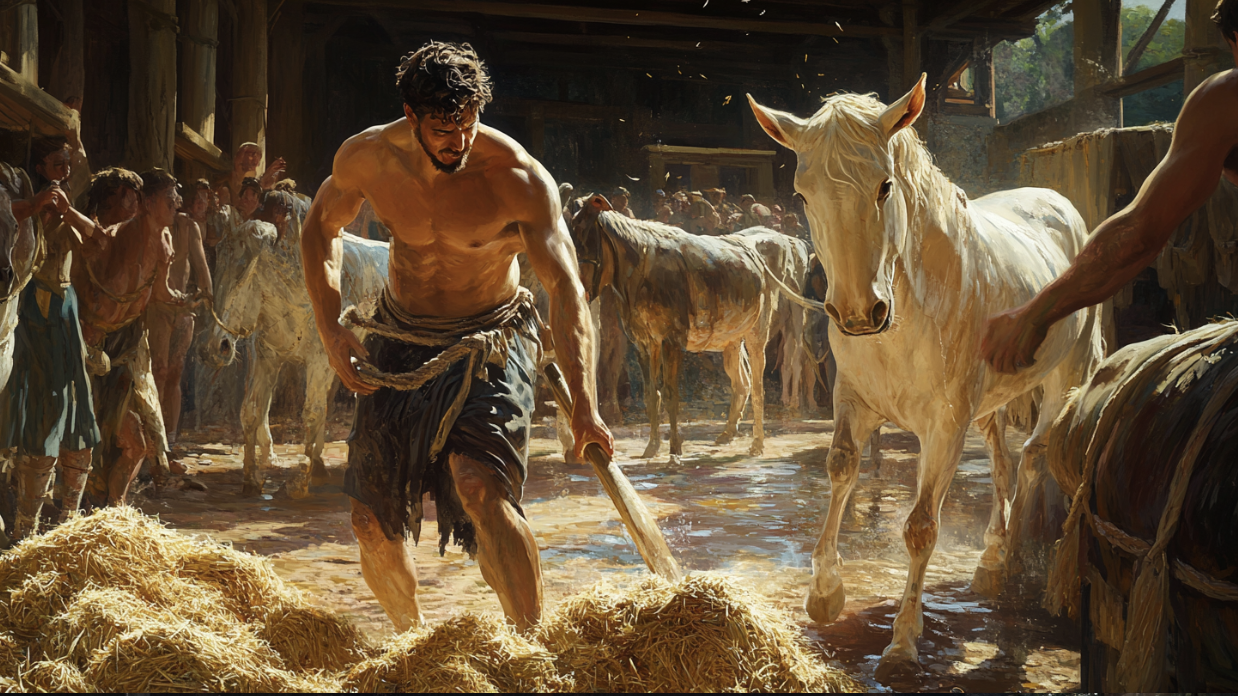
The Augean Stables is one of the most famous and seemingly impossible tasks that Hercules faced during his Twelve Labors. Unlike the more traditional feats of strength, such as slaying monsters or capturing wild animals, this labor required ingenuity and problem-solving. It wasn’t just a test of Hercules’ physical might but also his ability to overcome challenges that seemed humiliating and unsolvable. The cleaning of the Augean Stables is a story of cleverness, defiance, and determination, and it shows that not all great tasks rely solely on brute force.
The Dirty Task: King Augeas and His Stables
Hercules’ fifth labor was given to him by King Eurystheus of Tiryns, who continually sought to humiliate and crush Hercules by assigning him tasks that were either dangerous or degrading. For the fifth labor, Eurystheus ordered Hercules to clean the stables of King Augeas, the ruler of Elis. These were no ordinary stables—Augeas owned vast herds of cattle, numbering in the thousands, and the stables had not been cleaned in over thirty years. They were overflowing with filth and waste, and the task seemed impossible to complete in a single day, which was the time limit set by Eurystheus.
King Augeas himself was a wealthy and powerful man, known for his massive herds of cattle, goats, and horses. However, his stables were notorious for being the filthiest in all of Greece. Eurystheus believed that this labor, designed to humiliate Hercules, would be a test of his endurance and willingness to perform even the most menial tasks.
Hercules’ Clever Solution
While the task seemed straightforward—clean the stables—it was the sheer size and accumulated filth that made it daunting. Rather than attacking the problem directly with shovels or manpower, Hercules devised a clever solution to finish the task quickly and efficiently.
Instead of physically removing the filth by hand, Hercules used his strength and intellect to reroute two nearby rivers, the Alpheus and Peneus, to wash through the stables. He diverted the rivers so that they flowed through the vast space of the stables, using the power of the water to clean out years of accumulated waste in a matter of hours.
With the force of the rivers at his command, the stables were completely cleaned in a single day, fulfilling the requirement of the labor. Hercules had completed the impossible task through sheer ingenuity rather than brute strength, demonstrating his ability to think outside the box when faced with overwhelming odds.
The Aftermath: Augeas Refuses to Pay
Before agreeing to clean the stables, Hercules had made a deal with King Augeas: in exchange for completing the task, Augeas promised to give him a tenth of his cattle as payment. However, after seeing that the stables were miraculously cleaned in a single day, Augeas refused to honor his agreement. He argued that Hercules had only succeeded by using the rivers, which he claimed was a form of cheating.
Hercules, outraged by the broken promise, took Augeas to court. In the end, Augeas’ own son, Phyleus, testified in favor of Hercules, revealing that the deal had indeed been made. Augeas was forced to pay, but he later expelled both Hercules and Phyleus from his kingdom in anger.
Despite completing the labor successfully, Eurystheus refused to count it as one of Hercules’ official Twelve Labors, claiming that Hercules had been paid for the work and therefore did not complete it solely as part of his punishment. This meant that Hercules would have to complete an additional labor to fulfill his penance.
The Symbolism of the Augean Stables
The cleaning of the Augean Stables is a story rich with symbolic meaning. On the surface, it shows Hercules’ ability to tackle even the most demeaning and seemingly impossible tasks, but it also reflects the importance of cleverness and resourcefulness in overcoming challenges. While Hercules was known for his incredible physical strength, this labor demonstrated that true heroism often requires intelligence and innovation as much as it does might.
In many ways, the Augean Stables represent a seemingly insurmountable problem—a task so overwhelming that it appears impossible to accomplish. Hercules’ solution of using nature’s own forces to clean the stables is a reminder that great challenges can often be solved with creativity and lateral thinking.
The myth also touches on themes of betrayal and justice. Augeas’ refusal to honor his agreement with Hercules shows that even great heroes can be deceived, and their efforts can go unappreciated. However, the eventual truth-telling by Phyleus and the resolution in Hercules’ favor reflect the Greek belief in the importance of justice, even in the face of deception.
Hercules’ Legacy
Though the cleaning of the Augean Stables was not counted as an official labor by King Eurystheus, it remains one of the most well-known and celebrated of Hercules’ feats. It shows a different side of the hero—one that relied on cunning and strategy rather than brute strength alone. Hercules’ ability to turn even a demeaning and impossible task into a success demonstrates why he is remembered as one of the greatest heroes in Greek mythology.
Ultimately, the myth of Hercules and the Augean Stables teaches us that even the dirtiest, most thankless jobs can be conquered with determination and creative problem-solving. Whether facing monsters or mountains of filth, Hercules’ indomitable spirit and clever approach to challenges continue to inspire and resonate with audiences today.




